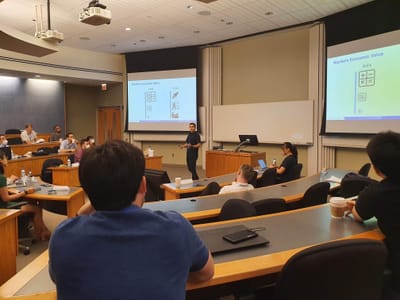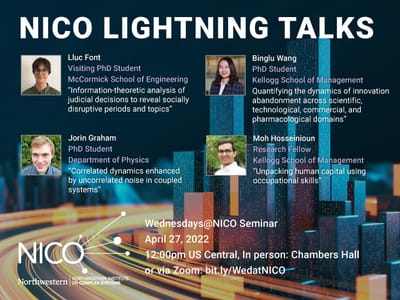Academic Website
I’m an Alfred Sloan Foundation Postdoctoral Fellow in the Management & Organizations Department at the Kellogg School of Management and a member of the Northwestern Institute on Complex Systems. I study the dynamics of skills, technologies, and organizations.
My research centers on two key questions: (1) How do human skills and technology—particularly AI—shape the organization of work? and (2) Which strategies help individuals, firms, and policymakers achieve their desired outcomes? Drawing on insights from management, organization theory, strategy, and sociology, I tackle these questions through a Computational Social Science lens.
Trained as an industrial engineer (BSc, MSc) and awarded a Ph.D. in Management Information Systems from the University of Illinois (Structure of Knowledge and the Role of General Capital), I bring a data-intensive, empirically grounded perspective to my work. Using computational modeling, network analysis, econometrics, and machine learning, I analyze large volumes of data to explore how AI and related technologies can complement human capabilities, drive innovation and entrepreneurship, and shape the future of work.
News
SFI Postdocs in Complexity Global Conference
I'll attend Santa Fe Institute Postdocs in Complexity Global Conference (Sep 15-18).
Alfred Sloan Foundation Postdoctoral Fellowship Award
My research at Kellogg School will be supported by a Sloan Foundation Fellowship. With Prof. Brian Uzzi, I’ll explore how AI is transforming innovation & discovery—building on work around human capital, search strategies, org structures & resource allocation.
Conference News - IC2S2
I presented my paper, A Complexity Approach to Human Capital, a collaboration with Hyejin Youn, Frank Neffke and LT Zhang at IC2S2 2024 in Philly—mind the drawing behind me on the board!!! Find a preprint here: https://arxiv.org/abs/2303.15629
Job Update
I will start as a Postdoctoral Fellow at the Dept. of Management & Organizations of Kellogg School of Management in Jan 2024.
PhD Graduation
PhDed (on a cold windy Chicago day).
Research
Event Recap
Teaching
ABOUT
Professional Journey
I earned both my bachelor’s and master’s degrees in Industrial Engineering and Systems before working as a Systems and Process Engineer at several small companies, then spending nearly a year as an Engineer-in-Residence at Caterpillar Inc. There, I closely observed and interviewed engineers, manufacturing workers, and operators, documenting production tasks and processes. Drawing on these insights, I helped improve safety measures, reorganize tasks, standardize processes, and optimize maintenance schedules. I also liaised with production suppliers across the state, building a database to support machine learning approaches for testing critical supplies. These industry experiences continue to inform my research, particularly my focus on productivity, innovation, and how new technologies reshape the structure of work.
Outside the Office
I enjoy playing soccer, volleyball, skiing, and music and cooking in my spare time. I’m an avid reader and love learning new languages—beyond Persian and English, I speak a bit of French and I’m currently tackling Mandarin. I’m a huge fan of coffee, ice cream, and especially coffee ice cream!
I earned both my bachelor’s and master’s degrees in Industrial Engineering and Systems before working as a Systems and Process Engineer at several small companies, then spending nearly a year as an Engineer-in-Residence at Caterpillar Inc. There, I closely observed and interviewed engineers, manufacturing workers, and operators, documenting production tasks and processes. Drawing on these insights, I helped improve safety measures, reorganize tasks, standardize processes, and optimize maintenance schedules. I also liaised with production suppliers across the state, building a database to support machine learning approaches for testing critical supplies. These industry experiences continue to inform my research, particularly my focus on productivity, innovation, and how new technologies reshape the structure of work.
Outside the Office
I enjoy playing soccer, volleyball, skiing, and music and cooking in my spare time. I’m an avid reader and love learning new languages—beyond Persian and English, I speak a bit of French and I’m currently tackling Mandarin. I’m a huge fan of coffee, ice cream, and especially coffee ice cream!

